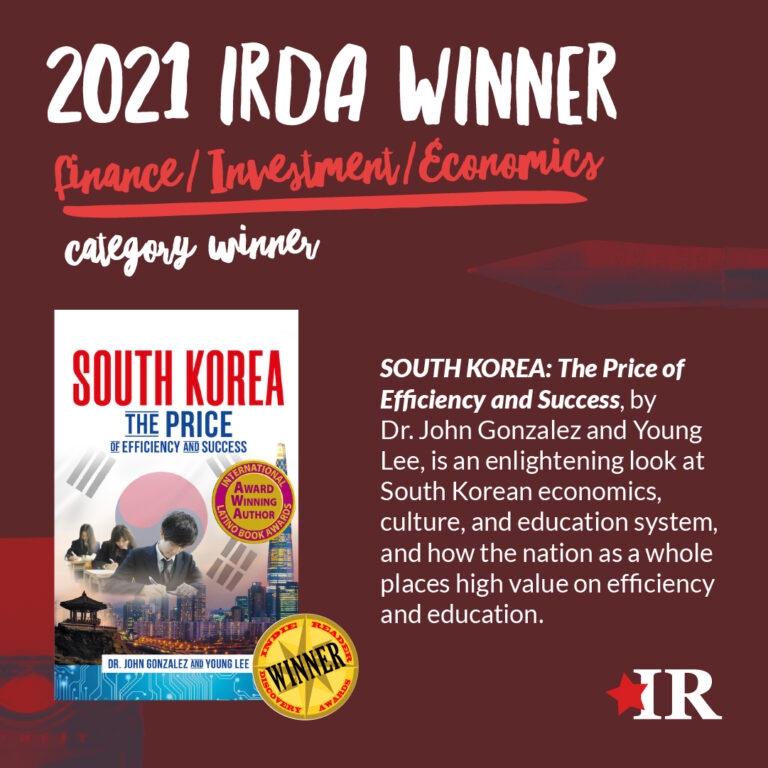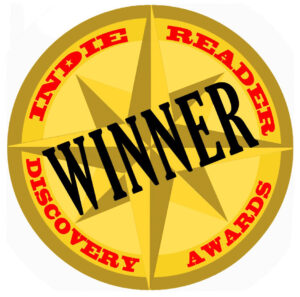SOUTH KOREA: The Price of Efficiency and Success was the winner in the Finance/Investment/Economics category of the 2021 IndieReader Discovery Awards, where undiscovered talent meets people with the power to make a difference.
Following find an interview with author John Gonzalez (note: co-author is Young Lee).
What is the name of the book and when was it published?
The title of the book is SOUTH KOREA: The Price of Efficiency and Success. It was published on December 22, 2019
What’s the book’s first line?
“I began visiting Korea in the 1990s.”
What’s the book about? Give us the “pitch.”
Through storytelling, we share some of the Korean people’s most humanistic attributes that have their roots in the Confucian and Daoist traditions and have survived the tension between traditional values and an endorsement of globalization and modernization.
The book examines the behavioral and cultural patterns that transformed South Korea from a poor and underdeveloped nation with few natural resources, devastated after the Korean War, to become an economic powerhouse. Through extensive research from a socio-cultural perspective combined with the authors’ first-hand experiences, we show that the same patterns that existed during the economic expansion and urbanization period are still present today even though the country is at a different stage of development. These patterns emphasize pragmatism and efficiency in a highly competitive environment resulting in a litany of man-made and industrial accidents and growing social inequality.
What inspired you to write the book? A particular person? An event?
The April 16, 2014 Sewol ferry disaster inspired me to write the book. The accident killed over 300 people, most of them high school students on a field trip to Jeju Island. At the time, I was working as a teacher/guidance counselor at an American high school in South Korea. My initial reaction to the news about the sinking of the ferry was, “My students and I could have been on that boat.” Following this incident, I began to keep track of the litany of man-made and industrial accidents that happened during my 5-year sojourn in Korea. As a result, I became curious as to the causes of those accidents. I was particularly intrigued by the question, “Why is such an economic and technological superpower like Korea prone to accidents?” This question, along with my fondness for the country, its culture, and people, left no doubt in my mind of my desire to write a book about Korea.
What’s the main reason someone should really read this book?
(1) To find out how a country transformed itself after a devastating war to become a model economy with a thriving industry and exporting highly advanced technology capable of competing against all comers; (2) to discover what Korea is really like behind the glamour and glitz of K-Cosmetics, K-Drama and K-Pop; and (3) to learn how other developing countries can benefit from Korea’s successes as well as the areas that missed the mark.
When did you first decide to become an author?
I decided to become an author following the sinking of the Sewol ferry.
Is this the first book you’ve written?
Yes, this is my first book. Now that I have gone through the process once, I found it enjoyable. Also, I firmly believe that my creativity and interest in writing will enable me to extend my repertoire in other genres.
What do you do for work when you’re not writing?
I am a retired educator. Even though I do not have a formal job, I like to continue to practice the profession I love so much. I volunteer to teach yoga/meditation to community members who cannot pay for classes or membership fees. The pandemic has enabled me to provide this service to the community online. When the pandemic is entirely under control, I would like to resume my world travels.
How much time do you generally spend on your writing?
It varies depending on other responsibilities; however, I like to write consistently from one to five hours a day.
What’s the best and the hardest part of being an indie?
The best part about being an indie writer is the flexibility to write at my own pace; I set my deadlines and targets. The worst part is promoting my writing because it’s so demanding and labor-intensive. My learning curve in this area is vast, and I lack the confidence to do an excellent job at it. Also, I find that it keeps me from exercising my creativity, and it is rather challenging to switch gears and go from promoting my book back to writing or vice versa. These activities require two very different skills sets.
Would you go traditional if a publisher came calling? If so, why?
I would consider going traditional if a publisher came calling. Having a publisher would make my writing widely available and get the word out about my writing more effectively.
Is there something in particular that motivates you (fame? fortune?)
My motivation is internal. I believe that I have lots to share and the writing ability to express myself in other genres.
Which writer, living or dead, do you most admire?
Ernest Hemingway.
Which book do you wish you could have written?

